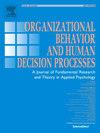并非所有的职场八卦都是一样的:从道德-情感的角度看八卦类型如何影响接受者对八卦者的反应
IF 3.8
2区 管理学
Q2 MANAGEMENT
Organizational Behavior and Human Decision Processes
Pub Date : 2025-08-26
DOI:10.1016/j.obhdp.2025.104440
引用次数: 0
摘要
关于流言接受者对流言者的反应,现有的研究给出了不同的观点和证据。我们的研究调和了这些差异,提出答案取决于接受者收到的职场八卦的类型,以及每种类型产生的道德情感。基于Lee和Barnes(2021)的类型学——区分两种类型的负面八卦(即基于贬义和基于保护的八卦)和两种类型的积极八卦(即基于认可和基于交流的八卦)——并借鉴道德情感理论,我们认为,四种类型的职场八卦通过引发不同的道德情感,导致接受者对八卦者表现出不同的反应。具体来说,我们假设基于贬损的八卦会通过道德厌恶导致回避行为,基于保护的八卦会通过感激导致帮助行为,基于支持的八卦会通过道德提升导致支持模仿,而基于交流的八卦会通过伴侣之爱导致社交行为。为了验证这些假设,我们首先按照预先注册的程序制定了措施,用三个不同的员工样本来捕捉四种类型的职场八卦的接收情况。然后,我们使用互补的方法进行了三项预注册研究:多波调查研究、基于回忆的实验和基于场景的实验。结果完全支持我们的假设。最后,我们讨论了研究结果的理论和实践意义。本文章由计算机程序翻译,如有差异,请以英文原文为准。
Not all workplace gossip is equal: A moral-emotions perspective on how gossip type shapes recipients’ reactions to gossipers
Existing research has presented mixed perspectives and evidence on how gossip recipients react to gossipers. Our work reconciles these discrepancies by proposing that the answer depends on the type of workplace gossip the recipient receives and the moral emotion each type generates. Building on Lee and Barnes’ (2021) typology—which distinguishes between two types of negative gossip (i.e., derogation-based and protection-based) and two types of positive gossip (i.e., endorsement-based and communion-based)—and drawing on moral emotion theory, we argue that the four types of workplace gossip lead recipients to exhibit divergent responses toward the gossiper by eliciting different moral emotions. Specifically, we hypothesize that derogation-based gossip leads to avoidant behavior through moral disgust, protection-based gossip leads to helping behavior through gratitude, endorsement-based gossip leads to endorsement emulation through moral elevation, and communion-based gossip leads to socializing behavior through companionate love. To test these hypotheses, we first developed measures following a pre-registered procedure to capture the receipt of the four types of workplace gossip with three separate samples of employees. We then conducted three pre-registered studies using complementary methods: a multi-wave survey study, a recall-based experiment, and a scenario-based experiment. The results fully supported our hypotheses. We conclude by discussing the theoretical and practical implications of our findings.
求助全文
通过发布文献求助,成功后即可免费获取论文全文。
去求助
来源期刊
CiteScore
8.90
自引率
4.30%
发文量
68
期刊介绍:
Organizational Behavior and Human Decision Processes publishes fundamental research in organizational behavior, organizational psychology, and human cognition, judgment, and decision-making. The journal features articles that present original empirical research, theory development, meta-analysis, and methodological advancements relevant to the substantive domains served by the journal. Topics covered by the journal include perception, cognition, judgment, attitudes, emotion, well-being, motivation, choice, and performance. We are interested in articles that investigate these topics as they pertain to individuals, dyads, groups, and other social collectives. For each topic, we place a premium on articles that make fundamental and substantial contributions to understanding psychological processes relevant to human attitudes, cognitions, and behavior in organizations. In order to be considered for publication in OBHDP a manuscript has to include the following: 1.Demonstrate an interesting behavioral/psychological phenomenon 2.Make a significant theoretical and empirical contribution to the existing literature 3.Identify and test the underlying psychological mechanism for the newly discovered behavioral/psychological phenomenon 4.Have practical implications in organizational context

 求助内容:
求助内容: 应助结果提醒方式:
应助结果提醒方式:


